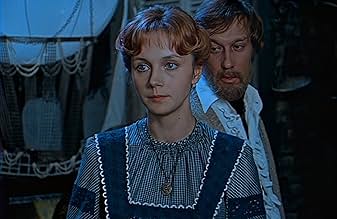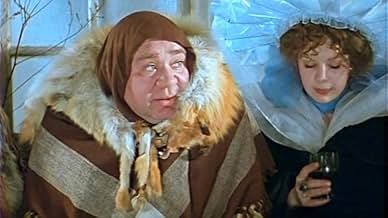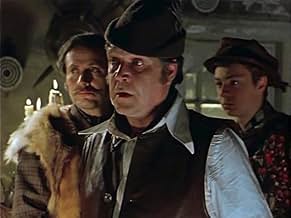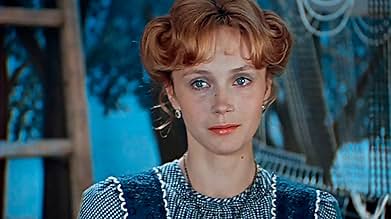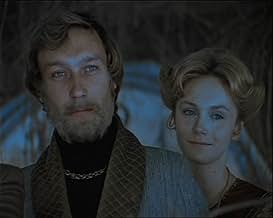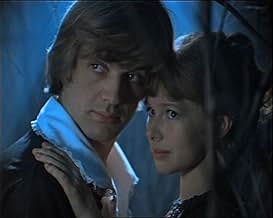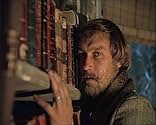Obyknovennoe chudo
- Téléfilm
- 1979
- 2h 18m
ÉVALUATION IMDb
8,0/10
3,6 k
MA NOTE
Ajouter une intrigue dans votre langueThe Wizard's magic got out of control because it touched human feelings.The Wizard's magic got out of control because it touched human feelings.The Wizard's magic got out of control because it touched human feelings.
- Director
- Writers
- Stars
Tatyana Ignatova
- Servant
- (as T. Ignatova)
Avis en vedette
10sim-13
A beautiful film with great actors. A magician turns a bear into a young man who must kiss a princess in order to turn back into a bear. Leonov is hilarious as the King.
Phantasmagoria. The second film adaptation of the play of the same name by the famous Soviet playwright and writer Yevgeny Lvovich Schwartz, since the first was released already in the sixty-fourth year. I have not read the play itself, I have not watched the first film adaptation, so I will evaluate this film adaptation as an independent work. I first looked at this masterpiece of Mark Zakharov in 1915, when I began to collect a collection of Soviet classics, and then it made a favorable impression on me, since then I have revised it several times - and every time I got pleasure again. And here's my brief opinion - A wonderful and touching love story. I will say right away that I did not find any flaws in the picture, although I tried, therefore I intend to dwell on the expressive merits of this brilliant phantasmagoria of Mark Anatolyevich Zakharov.
So, here they are:
1. Romantic story - the picture tells about the love between a young man named Bear and a beautiful princess, whose connection into a single whole is prevented by only one thing - the spell that the Wizard put on him - if he kisses the princess, he will again become a bear, which becomes the beginning of a series phantasmagoric situations, brilliant dialogues, a twisted story and a great ending. Here you and the throwing of the Wizard with his inventions and twists of history, irony over the monarchy, ridicule of vicious human qualities, but first of all, this story is about pure love, full of mental anguish and happy moments. And the monologue of the Wizard, performed by the magnificent Oleg Yankovsky, makes you each time amazed at the simplicity of everyday, but such important things, and re-perceive them as a gift from higher powers. Well, the romantic line itself turned out exactly as it should - sincere, emotional, replete with sharp turns, even a little predictable, but very memorable, and the actors themselves did their best!
2. The mood of the picture is melancholic, enthusiastic, philosophical, romantic. It includes all of this, mixing into a unique tone that I have not met anywhere else (there is something similar in "The Same Munchausen", but there is a different mood and a different message). This is precisely the phantasmagoria - the author's vision, where everything is literally mixed, but this does not cause dissonance or a feeling of slight discomfort in the viewer.
3. Music - not the last role in shaping the mood of the picture is played by music, for which Gennady Gladkov was responsible. And the songs were a success, although I don't like all of them.
4. Wonderful actors - real mastodons of Soviet cinema play here, who, thanks to their acting, pull them out of the meager scenery. Here you have Andrei Mironov as a charming scoundrel, Yevgeny Leonov as a tyrant and tyrant king, Ekaterina Vasilyeva as the first royal lama, Yuri Solomin as Emil, Vladimir Dolinsky as an executioner, Ervand Arzumanyan as a close-minded and charming first minister, and so on. ... Everyone is nice to look at. Everyone is interesting to watch. Each of them is not a "cardboard box", but a full-fledged character, endowed with his own character.
A little about the main characters:
1. The Master (Magician) performed by Oleg Yankovsky is the main storyteller and storyteller who is responsible for all the vaudeville going on. A decent inventor, convinced that he is always right until he becomes a witness to something else, which fundamentally convinced him of the falsity of his own infallibility. Well, I already spoke about the monologue. Oleg Ivanovich pleased me again with his acting. Bravo!
2. The mistress, performed by Irina Kupchenko, is the Wizard's faithful wife, a muse, without whom he could not have composed even a third of his works. An example of femininity, gallantry, kindness and spirituality. And their relationship with the Wizard just needs to be seen. Graceful and beautiful Irina Petrovna pleased with her talent. Bravo!
3. The bear performed by Alexander Abdulov and the Princess performed by Evgenia Simonova - our couple in love, who experiences all the difficulties and joys of love. There is a "spark" between characters and actors. Great couple! Bravo!
Despite the fact that I love this work of Mark Anatolyevich, my heart prefers his own painting "That same Munchausen", which is closer to me in spirit.
As a result, we have Mark Zakharov's masterpiece phantasmagoria about the gateways of love, with an excellent story, unique atmosphere, great music and songs, and ingenious acting works.
Mark Zakharov has done a number of interesting, allegoric films ('To Kill a Dragon', for one), often adapting plays of Yevgeni Shvarts. Yet 'An Oridnary Miracle' is much more than just one in a bunch.
What we have here is a tale coming to life, an allegory in its full sense. The plot is centered around the Wizard, played superbly by Oleg Yankovsky, and his wife (another fantastic performance by Irina Kupchenko). The Wizard utters words, and we see them come to life - literally. He is dictating every move of this story, setting the pace and force of action. Creating a solid world by imagination, a world that stumbles upon his tired wife and wouldn't leave until set right.
The center of this imaginary world is a love story, a fairy tale of a bear turned into a man who has to be kissed by a princess to return to his true form. Zakharov handles this in a beautiful way. The love story is very romantic, yet never too sweet, accompanied with superb supporting characters of the King (Yevgeni Leonov) and his Minister Administrator (Andrei Mironov), the very stars of the Soviet Russian cinema.
Everything is very theatrical in this movie. Anotther commenter here mentioned it's due to Zakharov's occupation as a theatre director. Yet it seems there's more to it, since other pictures of his hold less of this stage atmosphere. Having seen this movie numerous times, i like to think this 'theatricity' as, for one, an homage to Shvarts' plays, and also as yet another allegory of life and imagination, when everyone of us can be creators of many things. Creating our own life, which is nothing but an (un)ordinary miracle.
The whole movie, i think, comes to a simple truth, articulated in many masterpieces (it would fit to remember Tarkovsky here): it is difficult to be a creator. This gift comes with its own rules, sometimes far beyond control. Yet by allowing it to come, we can produce small, ordinary miracles. To quote the theme song of the movie, 'awkwardly, funnily, illogically, mindlessly - miraculously'.
What we have here is a tale coming to life, an allegory in its full sense. The plot is centered around the Wizard, played superbly by Oleg Yankovsky, and his wife (another fantastic performance by Irina Kupchenko). The Wizard utters words, and we see them come to life - literally. He is dictating every move of this story, setting the pace and force of action. Creating a solid world by imagination, a world that stumbles upon his tired wife and wouldn't leave until set right.
The center of this imaginary world is a love story, a fairy tale of a bear turned into a man who has to be kissed by a princess to return to his true form. Zakharov handles this in a beautiful way. The love story is very romantic, yet never too sweet, accompanied with superb supporting characters of the King (Yevgeni Leonov) and his Minister Administrator (Andrei Mironov), the very stars of the Soviet Russian cinema.
Everything is very theatrical in this movie. Anotther commenter here mentioned it's due to Zakharov's occupation as a theatre director. Yet it seems there's more to it, since other pictures of his hold less of this stage atmosphere. Having seen this movie numerous times, i like to think this 'theatricity' as, for one, an homage to Shvarts' plays, and also as yet another allegory of life and imagination, when everyone of us can be creators of many things. Creating our own life, which is nothing but an (un)ordinary miracle.
The whole movie, i think, comes to a simple truth, articulated in many masterpieces (it would fit to remember Tarkovsky here): it is difficult to be a creator. This gift comes with its own rules, sometimes far beyond control. Yet by allowing it to come, we can produce small, ordinary miracles. To quote the theme song of the movie, 'awkwardly, funnily, illogically, mindlessly - miraculously'.
This movie has always been a romantic inspiration to me. I understand, that for Western movie fans it must look too simple in terms of effects (if any :), but Mark Zakharov is a theatric director, so it is actually a movie PLAY, having a touch of theater.
Øýü afraid that the half of the original flavor will be devoured by any however good translation - humor, romance, smallest shades of mood or feelings. But if you will get into the movie, if you will find the right tune for it - you will discover a lot of wonderful things about yourself, about feelings...
Øýü afraid that the half of the original flavor will be devoured by any however good translation - humor, romance, smallest shades of mood or feelings. But if you will get into the movie, if you will find the right tune for it - you will discover a lot of wonderful things about yourself, about feelings...
10IlyaEck
Based on a play by Yevgeniy Shwartz, one of the best Russian playwrights of the 20th century, made by one of the best directors of the Soviet epoch with an unprecedented all-stars cast, this movie has instantly become a classic of Russian cinema and theatre alike. Critics may point out various flaws in it, still it is indispensable for anyone who is out to understand Russian culture a bit more, or just for anyone, I might add.
Le saviez-vous
- Citations
Minister Administrator: You are attractive. I am devilishly attractive. Why should we waste our time?
- ConnexionsFeatured in Namedni 1961-2003: Nasha Era: Namedni 1979 (1997)
- Bandes originalesPesnya Volshebnika
aka "Nelepo, smeshno, bezrassudno, bezumno, volshebno..."
Music by Gennadiy Gladkov
Lyrics by Yuliy Kim
Performed by Leonid Serebrennikov
Meilleurs choix
Connectez-vous pour évaluer et surveiller les recommandations personnalisées
Détails
- Date de sortie
- Pays d’origine
- Langue
- Aussi connu sous le nom de
- An Ordinary Miracle
- société de production
- Consultez plus de crédits d'entreprise sur IMDbPro
Contribuer à cette page
Suggérer une modification ou ajouter du contenu manquant

Lacune principale
By what name was Obyknovennoe chudo (1979) officially released in Canada in English?
Répondre
